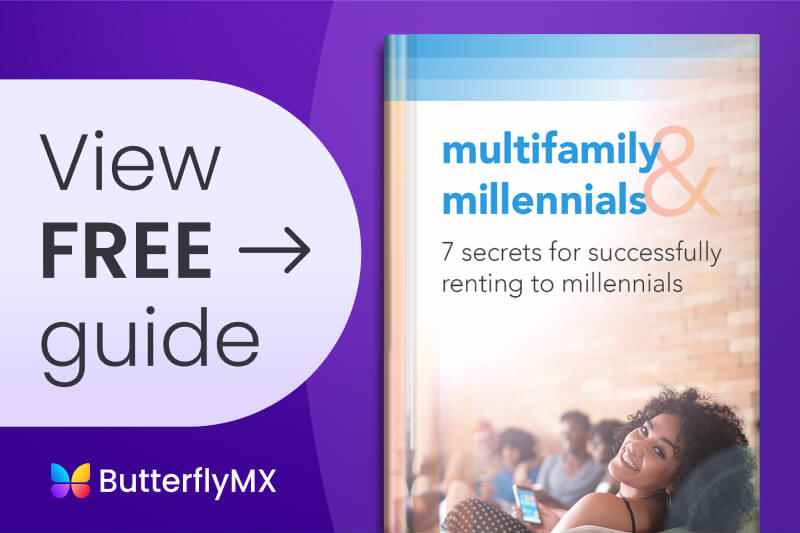
Screening prospective residents is the best way to ensure you rent to reliable tenants. Overall, developing an effective rental verification strategy is an essential responsibility of property managers that ultimately attracts great prospects. As a result, verifying a prospect’s rental history helps you guarantee that you’re choosing trustworthy residents for your apartment community.
Read on to learn what a rental verification is, how long it takes to conduct one, and why it’s so important. Then, discover 7 helpful questions to ask during rental history screenings.
This post will cover:
- What is a rental verification?
- How long does rental verification take?
- What does rental verification consist of?
- Why is resident screening important?
- 7 questions to ask for rental history verification
What is a rental verification?
Rental verification provides a snapshot of a prospective resident’s rental history so that you can determine if they’ll be a good fit for your property. Having an effective rental verification process reveals valuable information like whether a prospect has a history of evictions, property damage, or late rent payments.
Discovering this information early on in the tenant screening process will help you weed out unreliable prospects. So, you can focus on approving the right tenants.

What do you do if the resident doesn’t have a rental history?
There are a variety of reasons why a resident may not have a rental history. This could be due to previously living with their parents, or if they’re a recent graduate. For example, Gen Z and young millennial prospects may not have a rental history, but this doesn’t mean that they won’t be good residents.
If a prospect doesn’t have a rental history, there are alternative methods that you can use to determine if they’ll be a reliable resident.
You can:
- Conduct a background check
- Verify employment history and income
- Request a letter of recommendation from an employer or campus RA
How long does rental verification take?
Rental history verification usually takes anywhere from 48 to 72 hours. However, this process can take longer during peak renting season. Emailing a brief questionnaire to a prospect’s former landlord is the best way to help streamline the rent verification process.
Remember: Completing this process quickly and effectively is the best way to sign leases faster.

What does rental verification consist of?
- Application and consent. You must obtain consent from prospects before reaching out to previous landlords or property managers. You can obtain this written consent during the application process. Additionally, conduct a background check and verify their income prior to approving the application.
- Contact previous landlord or property manager. Contact the previous landlord or property manager via phone or email and ask them relevant questions about the prospect’s tenancy. Email is preferable, so you have a written record that you can refer back to. This will help you determine whether the prospect actually lived at the property and weed out fake rental verification submissions. For example, the prospect could have submitted a friend’s contact information instead of an actual landlord’s.
- Conduct rental background check. A background check is essential to ensure to verify a prospect’s income, any criminal history, and overall reliability. You can also ask the previous landlord or property manager relevant questions. This will reveal whether the prospect paid rent on time, had minimal property damage upon moving out, or received complaints from other tenants.
Explore how to implement self-guided tours at your building:
Why is resident screening important?
Resident screening is important because it’s the best way to ensure high-quality residents at your property. This helps ensure that prospects pay rent on time, don’t have a history of property damage, and aren’t disruptive to other tenants.
What’s more, this reduces the chances of approving a resident that isn’t a great fit for your apartment community.
7 questions to ask for rental history verification
Asking the right rental verification questions is the best way to determine whether a prospect will be suitable for your building. Consider creating a rental verification form that you can send to each prospect’s landlord or property manager to further streamline this process.
Here’s a list of the best questions to include in your renter’s verification questionnaire:
- Is the resident currently renting from you?
- How long did the resident rent from you?
- Did the resident ever damage the property?
- Were there any ongoing noise complaints lodged against the tenant?
- Was the resident ever more than 30 days late in paying rent?
- Did the resident ever have issues with other tenants?
- Would you rent to this resident again?
1. Is the resident currently renting from you?
Verifying rental history from the most recent landlord or property manager provides the most accurate view of how the prospect will conduct themselves as a resident. What’s more, this uncovers whether the prospect legally ended their lease with proper notice.
2. How long did the resident rent from you?
Long-term residents are ideal for any property. Finding new prospects for vacant units can be an expensive and time-consuming process, so long-term residents are preferable for any building.
If a prospect has a history of early move-outs, they probably won’t fulfill a long-term lease at your building. What’s more, this illuminates whether a resident broke or prematurely ended their lease.

3. Did the resident ever damage the property?
One of the most useful pieces of advice for property managers is knowing how to choose the right residents. So, it’s crucial to discern whether a prospect has a pattern of property damage.
If a prospect has a history of outstanding damages, you’ll want to know this before leasing a unit to them. Repairing general wear and tear after a move-out is to be expected, but if a prospect significantly damages units, they won’t be suitable for your building.
4. Were there any ongoing noise complaints lodged against the resident?
It’s vital to consider what kind of neighbor the resident will be to your other tenants. If a resident is disruptive, this could result in complaints and unhappy tenants. As a result, you may get a flood of complaints to your leasing office that may take a lot of time to resolve.
A rental history background check reveals whether a resident has a history of being disruptive or excessively noisy during quiet hours. What’s more, if a resident wasn’t following the rules at their previous building, they probably won’t respect or abide by the rules at your apartment community.
Discover 5 solutions to common resident complaints:
5. Was the resident ever more than 30 days late paying rent?
If the resident has a pattern of late rent payments, they may not be a suitable resident for your building.
A late rent payment every now and again is understandable under extreme circumstances following the loss of a job or unexpected illness. However, if a resident has a pattern of late rent payments, it’s important to be aware of this fact before approving their application.
What’s more, this will uncover any previous evictions in the prospect’s rental history.
6. Did the resident ever have issues with other tenants?
It’s natural for neighbors to have occasional disagreements, but they should be able to resolve those conflicts maturely. Recurring conflicts may be an indicator of how a prospect might conduct themselves at your building. Learning this information during the screening process is a great way to circumvent potential conflicts at your building.
7. Would you rent to this resident again?
One of the most important questions to ask during a rental background check is whether the previous landlord or property manager would rent to your prospect again. This will signal to you whether the resident is a good fit for your building.
Fostering a positive relationship between property managers and residents is the best way to boost resident retention. So, if a prospect had a great relationship with their previous landlord, this is a promising sign that they’ll integrate well at your building.

Takeaways
- Rental verification offers a rental history background check that uncovers whether a prospect paid rent on time, damaged the property, and had complaints lodged against them.
- Rental verification usually takes 48-72 hours to complete.
- Resident screening is the best way to ensure reliable tenants for your building.
- Send a brief questionnaire to your prospect’s previous landlord or property manager to determine if they’ll be a good fit for your building.







